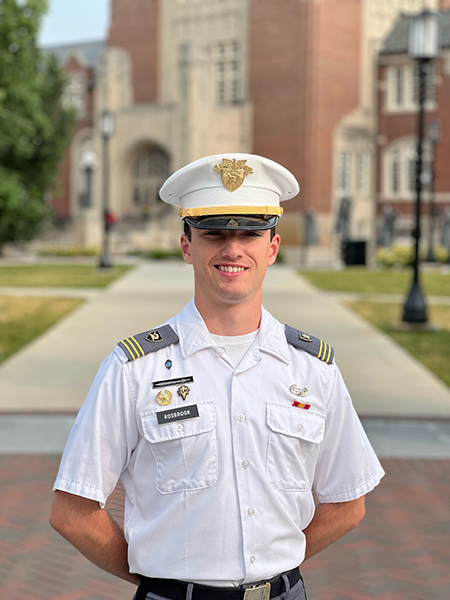With help from a fund honoring a fallen solider from Lafayette, Prof. Shreyas Sundaram partners with Purdue Military Research Institute to offer internship for a West Point cadet

Purdue University’s Elmore Family School of Electrical and Computer Engineering partnered with the Purdue Military Research Institute (PMRI) to offer a summer internship to a student from the U.S. Military Academy at West Point. Cadet Charles Rosbrook worked with Shreyas Sundaram, Marie Gordon Associate Professor of Electrical and Computer Engineering.
PMRI’s summer intern program coordinates with Purdue faculty to identify projects and then recruits cadets/midshipmen from U.S. military academies, Purdue’s ROTC detachments, and a small number of undergraduates from other universities/colleges such as the Veterans to Energy Careers (VTEC). The purpose is to introduce students to research as well as recruit them to Purdue’s graduate school.
J. Eric Dietz, director of PMRI, said the summer program for military interns has been quite impactful.
“To date, about 200 summer interns have learned about research, written papers, filed patent disclosures, and built connections with their academies,” said Dietz. “Some have continued to work with Purdue research labs long after their internship. Several have attended Purdue for MS degrees and one just earned his PhD in AAE.”
While at Purdue, Rosbrook worked with Prof. Sundaram and Purdue ECE grad student Dylan Taylor, a West Point alumnus, on a project titled “Cooperative Teaming of Autonomous Systems.” He studied path planning, doing independent research on different path planning methods and coding one of his own.
“It’s researching the best way for a missile, for instance, to pick where it’s going to go and how it’s going to get to its target while trying to avoid things such as radar and air defense missiles,” said Rosbrook. “It also can apply to things like robots that have to make their way through a maze, or basically any situation where you have something that needs a path to get somewhere while avoiding different obstacles.”
Rosbrook completed a literature review comparing different path planning methods and analyzing the effectiveness of the method he coded. Sundaram said it was a pleasure to work with Rosbrook. He said Rosbrook and Taylor are prime representatives of the outstanding caliber of students being trained at the USMA.
“I was very impressed by how much he (Rosbrook) accomplished despite the short duration of his stay,” said Sundaram. “In addition to ramping up very quickly on the core path-planning algorithms, he also proposed new and promising ideas for extensions on the state-of-the-art.”
Rosbrook said while the research experience was great, the source of the funding for the internship made it even more special. The support came from PMRI’s SGT Kyle Osborn Memorial Funds. Sgt. Osborn, a 2005 McCutcheon High school graduate, was killed in action September 13th, 2012, in Afghanistan. Rosbrook says he was honored to meet Osborn’s family when they came to West Point recently.
“A lot of soldiers that were in the 173rd with Kyle were there, as well” said Rosbrook. “When I got to meet his family and listen to the soldiers he served with speak, it was really moving.”
Rosbrook said he also met the Osborn family for dinner during his time in West Lafayette. Sundaram says Rosbrook was very deserving of the support from the memorial fund.
“I would like to convey my deepest respect and gratitude for Sgt. Osborn’s heroism and sacrifice,” he said. “I thank his family for honoring him via the scholarship funds – Cadet Rosbrook proved himself to be a very worthy recipient of the opportunity that those funds provided.”
Rosbrook said the internship has opened the door to doing similar research during his upcoming senior year at West Point. He said graduate school is definitely something he wants to do, but not immediately after graduating from West Point. Rosbrook is looking forward to his five years minimum in the Army and then attending grad school after that.
About the Purdue Military Research Institute
The Purdue Military Research Institute (PMRI) was established in the Fall of 2014 to focus on synergistic collaboration with military partners by offering access to some 1900 faculty conducting world-class research in numerous areas of significant interest to the U.S. Department of Defense. Housed in Purdue’s College of Engineering, PMRI partners with the Army, Navy and Marines, Air Force, and Space Force in three focus areas:
- A merit-based fellowship that covers all costs for a graduate degree (except for books and some small costs around graduation).
- A summer intern program for undergraduates from our military academies, Purdue ROTC, and select student veterans from other US universities/colleges.
- A faculty exchange program.
About the Elmore Family School of Electrical and Computer Engineering
The Elmore Family School of Electrical and Computer Engineering is the largest academic unit at Purdue University and the largest ECE department in the country. Established in 1888, the school offers both undergraduate B.S. degrees as well as M.S. and Ph.D. graduate degrees in Electrical Engineering and Computer Engineering. The school enrolls more than 1,900 undergraduates (sophomores through seniors) and over 1,300 graduate students. Degree programs on the West Lafayette campus are consistently ranked in the top 10 by the U.S. News & World Report. U.S. News also ranks the online master’s program in electrical engineering No. 1 in the nation. Purdue ECE aims to serve and lead the state of Indiana, the nation, and the world-wide profession of electrical and computer engineering, by educating the next generation of engineers, by discovery that advances fundamental knowledge and its applications, and by innovation and engagement that address global challenges of societal impact.
Writer: Kristin M. Malavenda, kmalaven@purdue.edu
Sources: J. Eric Dietz, jedietz@purdue.edu, and Shreyas Sundaram, sundara2@purdue.edu
